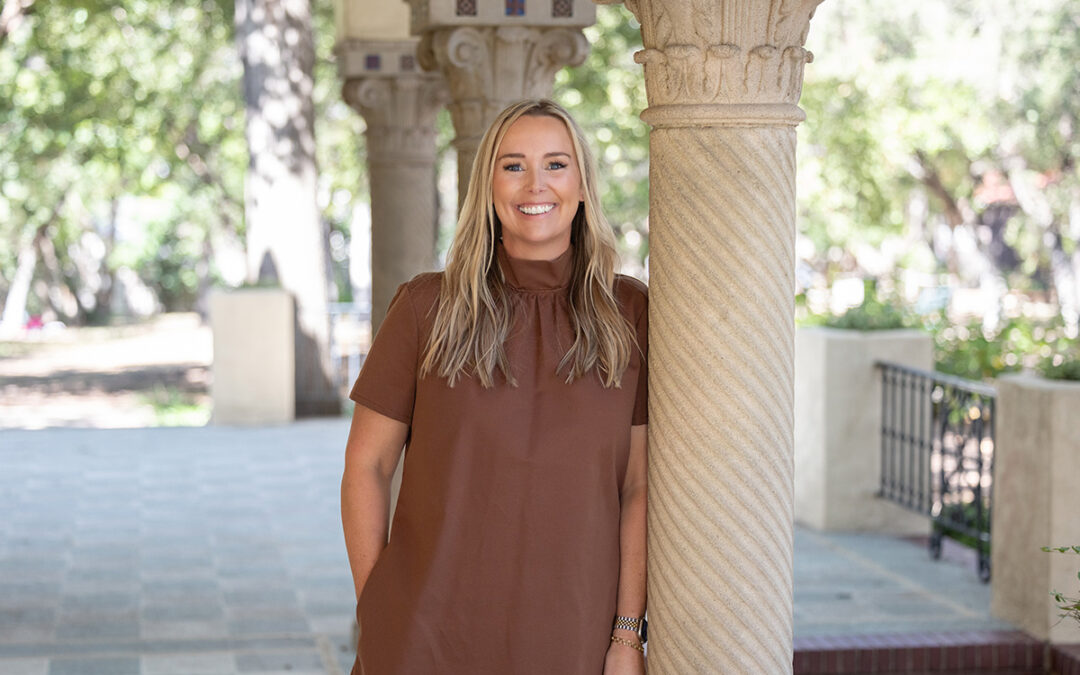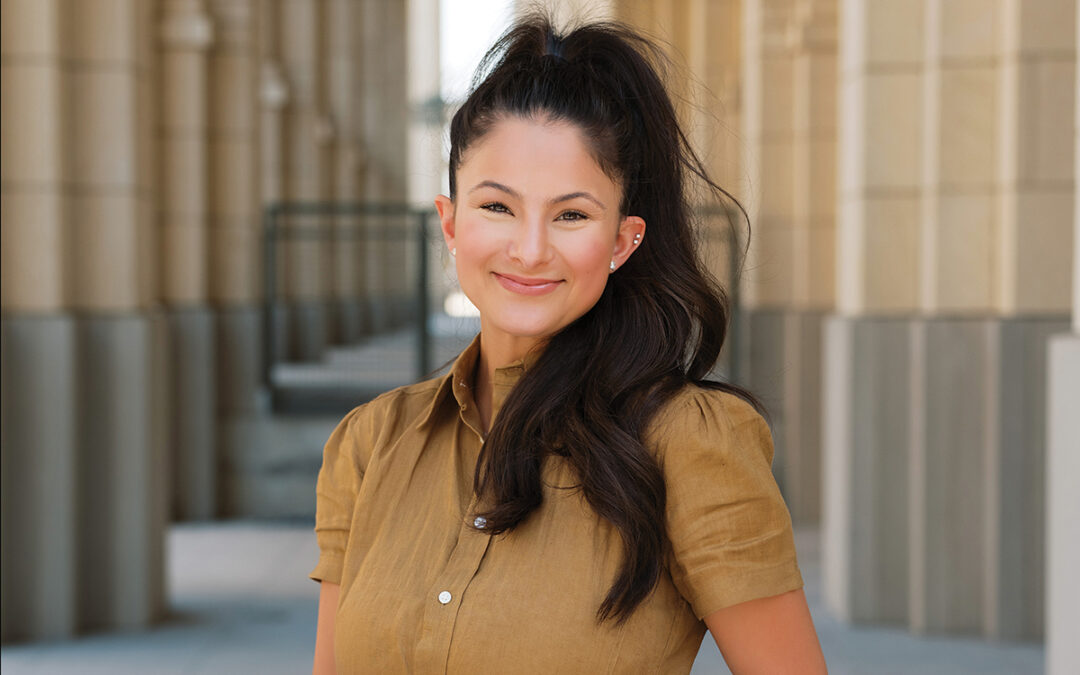There are around two dozen ponytails bobbing during a varsity girls’ volleyball practice at TMI: The Episcopal School of Texas. One of them belongs to the team’s coach, Courtney Duke, who’s right in the middle of the action through most of the practice.
Duke serves and returns air balls to show her players what she wants them to do, sometimes jumping straight up, nearly levitating to make her point. “Hurry, hurry, hurry,” she calls, as the girls switch sides of the net for another drill.
“I’m a high-energy person,” she says, during an interview in her office in the private school’s gym. A multisport athlete since childhood, Duke still runs, bikes and lifts weights to keep fit. Best of all, she says, “I like to work out with my kids.” That puts her out on the floor with her teen-age players — most of whom are taller than she is.
Being the smallest athlete in sight is not a new experience for Duke, who’s 5 feet tall and played college basketball. As a member of the women’s team at the University of Oregon in the late 1990s, she played point guard — “a fun position because you get to handle the ball alot,” she says.
At that time, she says, the next shortest players in Division I women’s basketball were probably around 5 feet, 8 inches tall. Duke earned scholarships by playing fast and smart but still remembers hearing a television announcer muse, “Now how can she shoot from out there?”
An early start with an athletic family gave her the confidence to defy stereotypes. “I shot my first basket off my uncle’s shoulders at my third birthday party,” she says, smiling. Growing up in a suburb of Los Angeles, she joined a co-ed teeball team in first grade, started basketball in second grade and picked up volleyball in sixth. Her parents both skied and played golf, and her father was one of her early coaches while she and her brother played in Japanese-American basketball leagues. Somehow, she found time to take up golf, too, and went to a lot of her brother’s sports practices as well as her own. “We were one of those families that does everything,” Duke says.
Her height wasn’t an issue until high school at the Polytechnic School, a private school in Pasadena, Calif. “My (basketball) coach said I was a great player, but too short,” she says. “I constantly felt I had to achieve, to make up for not being at least 5 feet 9.”
The extra effort paid off: As a senior, she was offered basketball scholarships by six schools, choosing the University of Oregon, whose sports programs were ranked among the nation’s top 10. Playing Division I basketball at a school that required athletes to maintain a 3.0 grade-point average — despite frequent traveling, in season, from Wednesday through Sunday — “taught me time management,” Duke says. At first, she planned to become a physical therapist, “but college science courses weren’t easy for me.” A folklore course at the university and a lifelong love of reading and writing inspired her to switch to an English major; before graduation in 1998 from Chapman University in Orange, Calif, she was considering graduate study toward becoming an English professor.
Her first job opportunity, however, was a position as a physical-education teacher at Polytechnic, the school she had attended since kindergarten. Though the school was a comfortable fit — “Everybody there knew me” — she was given an extra challenge when asked to coach varsity boys’ volleyball as well as girls’ basketball and volleyball. “It was a great experience,” Duke says. “People told me there would be a difference, working with boys, that you need to be so much harder on them. I don’t think there is a big difference between what boys and girls need in a coach: someone to teach them skills (whom) they can respect.”
Like many of her former teammates, Duke was attracted to college coaching; her next move was to Southwestern University in Georgetown, where for two years, she was assistant coach and recruiting coordinator for women’s basketball and volleyball. There, she worked
with women coaches who were “pioneers in women’s sports, with an incredible work ethic.” As a member of the post-Title IX generation — referring to the federal mandate of equal funding for girls’ and women’s sports — Duke says, “They were dedicated to women’s sports before there was much support for that. I learned a lot from them.”
While at Southwestern, Duke met her husband when she went to a barbecue dinner party at the home of a university colleague. Matt Duke, a young accountant, was a Poth High School classmate of the hostess, who introduced the future couple. The Dukes married four years ago and moved to San Antonio two years ago. For a few weeks, they lived in Poth, a small town south of San Antonio.
After growing up in the Los Angeles area, with its large Asian-American population, Courtney experienced some culture shock. In Southern California, she was part of a Japanese-American community, attending a Japanese Free Methodist Church as well as playing in Japanese-American sports leagues. In South Texas, she became a “minority minority,” far outside her familiar cultural context. At first, “People thought I was Hispanic,” she says, and the confusion sometimes led to uncomfortable situations. Occasionally, she has heard racial slurs against Asians, “and I have to let it be known that making “slanty-eyed’ jokes is not OK. I keep educating people,” she says.
In her third year of teaching at TMI — a private school for grades 6-12 in northwest San Antonio — Duke has found a comfortable environment. “The students are eager to learn, they’re full of energy,” she says. “The best part of my job is the people: Students, faculty and staff here are all appreciative of each other.” Private-school teaching appeals to her because of the small class size, and she likes the age groups with which she works, as middle-school English teacher and coach. “They’re still young enough to be open to new things, to making positive changes,” she says.
More than once in her career of coaching at the high-school level, Duke has helped turn around low-performing teams by teaching fundamentals and holding her players to a higher standard. “With teen-age girls,” she says, “you might have to get them out of the habit of not competing, that it’s OK if you don’t win, that it’s all right to finish the season in fourth or fifth or last place.”
Girls, as well as boys, can work out to get stronger: “They need to learn how to push themselves until they think they can’t take another breath — then take it.” As TMI’s head coach of girls’ varsity volleyball and basketball, she runs practices comparable in time and intensity to those of the boys’ teams. “I tell (my players), “See, you’re staying just as late, working just as hard as the football team,'” she says.
Though Duke also works long hours from early meetings to late practices, she prefers the pace of life at the high-school level. “I still think about college coaching sometimes,” she says. “But I want to have a family, too.”
She stays in touch with friends from her former basketball teams who have gone on to coach at the college level. None is married, she says, and only a few are in serious relationships. Keeping a demanding schedule of practices, games and recruiting, she says, “They’re traveling all the time. It’s not impossible to have a family and do that kind of job well, but I would want to be great at both and I can see where there would be a lot of conflicts.” Rather than looking back at college athletics, she’ s looking forward to earning a master’s degree in sports administration. “I got accepted at UTSA,” she says, laughing. “But I don’t have time to go to the classes.” Instead, she’s thinking about pursuing the degree online, through the University of Houston.
Meanwhile, there’s a lot of satisfaction in her job. Besides running, biking and lifting weights to stay fit — serious basketball is out after knee surgery — she loves “working out with the kids, doing what they do to stay active.” Duke’s style seems to have benefited her players, too. Last year, the TMI girls’ basketball team doubled its previous year’s record of wins.
Sports participation is required for girls as well as boys at the Episcopal school, founded in 1893 as West Texas Military Academy (later Texas Military Institute), then an all-boys military school, now a co-educational institution with an optional military program. “For a school that was once all-male, we’ve done a good job with women’s sports,”says Duke, who was promoted last year to assistant athletic director, the first female in that position in the school’s history. As she sees it, good players bring talent and discipline to the game, while a good coach, she says, is skilled at communicating what she has learned.
“When I know I have done a great job coaching, I feel I have contributed to the win,” she says. “That’s one of the perks of the job.”









0 Comments